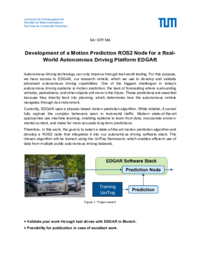ROS2 Motion Prediction Node for EDGAR - a Real-World Autonomous Driving Platform
- Institute
- Lehrstuhl für Fahrzeugtechnik
- Type
- Semester Thesis Master's Thesis
- Content
- experimental theoretical
- Description
Autonomous driving technology can only improve through real-world testing. For this purpose, we have access to EDGAR, our research vehicle, which we use to develop and validate advanced autonomous driving capabilities. One of the biggest challenges in today’s autonomous driving systems is motion prediction, the task of forecasting where surrounding vehicles, pedestrians, and other objects will move in the future. These predictions are essential because they directly feed into planning, which determines how the autonomous vehicle navigates through its environment.
Currently, EDGAR uses a physics-based motion prediction algorithm. While reliable, it cannot fully capture the complex behaviors seen in real-world traffic. Modern state-of-the-art approaches use machine learning, enabling systems to learn from data, incorporate environmental context, and make far more accurate long-term predictions.
Therefore, in this work, the goal is to select a state-of-the-art motion prediction algorithm and develop a ROS2 node that integrates it into our autonomous driving software stack. The chosen algorithm will be trained using the UniTraj framework, which enables efficient use of data from multiple public autonomous driving datasets.
Test drives with EDGAR in Munich.
Possibility for publication in case of excellent work.
- Requirements
Requirements:
-
Very good programming skills in Python and C++.
-
High personal motivation and independent working style.
-
Very good language proficiency in German, English or French.
-
- Software
- Python, C++
- Tags
- FTM Studienarbeit, FTM AV, FTM AV Perception, FTM Stratil, FTM Informatik, FTM IDP
- Possible start
- sofort
- Contact
-
Loïc Stratil, M.Sc.
Room: MW 3508
Phone: +49.89.289.15898
loic.stratiltum.de - Announcement
-
